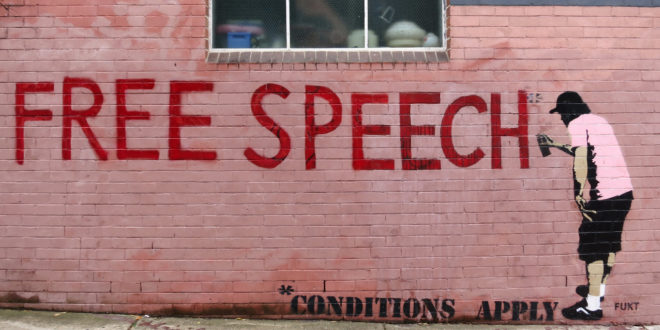The suspension of the Twitter account of former U.S. president Donald Trump after violating the platform’s publishing policies brought forth significant controversy and aroused many questions about the right to freedom of expression and its boundaries, not only in the United States, but across the globe. In the Arab region, with ample comparisons being drawn between the insurrection at the capitol and various regional conflicts and uprisings, and questions around freedom of expression ever present, it is useful to unpack local perspectives on the significance of Trump’s removal from social media and the power these major tech companies wield over public expression. Below is an examination of these events, the structures in place that facilitated them, and what some key regional voices think about freedom of expression and the role of big tech.
Twitter is an American microblogging and social networking service on which users post and interact with messages known as "tweets". The suspension of the former U.S. President Trump was not sudden, but came after several warnings of violation of the guidelines that act as a governance document for the Twitter platform.
According to Twitter, the account of the former U.S. president (@realDonaldTrump) has been permanently suspended “due to the risk of further incitement of violence.” The platform stated that the decision came after a close review of his recent Tweets in which they found several violations of their rules and policies. The Twitter Safety account (@TwitterSafety) tweeted “after close review of recent Tweets from the @realDonaldTrump account and the context around them we have permanently suspended the account due to the risk of further incitement of violence.” The TwitterSafety account has also published a Twitter Violent Threats policy. Twitter prohibits any statement of intent to inflict violence on a specific person or group of people, and it too prohibits any glorification of violence. In addition to the “violent threat policy”, Twitter has “abusive behavior” and “hateful conduct” policies that are enforced in tandem.
Twitter warned Trump before the permanent suspension by giving him a 12-hour time-out from the platform after he named the people who stormed the US Capitol "patriots".
According to Twitter, there are three basic values on which they base their decision: a) freedom of expression, b) protection of people who are off platform and c) protection of privacy. Yet, the protection of people off platform carries more weight than the other two. In a way, this explains the suspension act where Twitter saw that Trump’s tweets are harming people who are off the platform through inciting others to behave in a certain way, or labelling some aggressive behaviors as “patriotic”. This was especially apparent after hundreds of his supporters entered the complex as the US Congress and the subsequent violence led to the deaths of four civilians and a police officer.
Looking into this incident, one can say that it has two elements that require discussion: the first relates to the limits of freedom of expression and the second is concerned with the extent of power wielded by media empires.
In response to the suspension of his social media accounts, Trump said that he will look into the possibility of building other platforms to compete with Twitter and its exercise of power over deletion of tweets or suspension of accounts. This debate continued to heat up after Google took the same approach as Twitter and suspended the Parler app from its Play Store after it failed to remove inappropriate content, especially those inciting violence. Parler, a platform app, was launched in 2018 and, according to the BBC news website, it proved popular among Trump supporters and right-wing conservatives. Parler defines itself as an objective social media platform, yet it is known for its popularity among people who are banned from Twitter. Apple has done the same in its warning to remove Parler from the App Store if it does not comply with its content moderation requirements.
While Mr. Trump himself is not a user, the platform became the most-downloaded app in the United States after the 2020 US election. Both Apple and Google have said the app fails to comply with content-moderation requirements.
In his analysis piece, “Necessary or draconian action?”, Shayan Sardarizadeh at BBC Monitoring, says Parler became a right-wing echo chamber through posting messages that favor the overturn of the election outcomes. However, the removal of the app from the Google Play or Apple Store raises concerns about freedom of speech and expression on online platforms, and it might represent “draconian” behavior by major tech companies.
Is there a necessity of issuing new laws?
In the 1920s and 1930s, democratic governments found themselves encountering great new challenges due to the advent of radio, which was the new technology at the time. Infamous figures such as Adolf Hitler and Joseph Stalin used radio stations to generate suspicion, anger, and violence. But soon ways were found to regulate broadcasting and use these channels for democratic purposes. One such example was the launch of the British Broadcasting Corporation, which was designed from the start to reach all parts of the country, in order to "inform, educate, and entertain," and interact with citizens by presenting different opinions and ideologies. The United States and many European countries, began to put in place a regulatory framework and set of rules to determine who can obtain a license for radio stations.
Currently there are demands for a model governing social media platforms, equivalent to licensing traditional radio and television stations in the world of social media, and working to find organizational, social, and legal measures that make this technology work in the interest of society and promote democracy, and not only for the benefit of the owners of social media platforms. This requirement does not aim to impose any kind of censorship. Indeed, a regulatory framework on social media platforms with rules on transparency, privacy, user data protection, and competition protection, is a necessity.
In an article by the Financial Times, German chancellor Angela Merkel criticized Twitter’s permanent suspension of Trump and considered it a violation of the “fundamental right to free speech.” In addition, Alexei Navalny, the Russian anti-corruption blogger, said that such an act would be misused by the enemies of freedom of expression.
Twitter CEO, Jack Dorsey, was reluctant to explain his decision to ban Trump from Twitter, he said the ability for companies to shut down users' accounts "will be destructive to the noble purpose and ideals of the open internet."
It is worth mentioning that during Trump’s presidential period, he was advocating to make changes to Section 230 in the Communication Decency Act (CDA), which is viewed as the most important law protecting Internet speech. Section 230 says that, "No provider or user of an interactive computer service shall be treated as the publisher or speaker of any information provided by another information content provider.” In other words, online intermediaries that host or republish speech are protected against a range of laws that might otherwise be used to hold them legally responsible for what others say and do. The protected intermediaries include not only regular Internet Service Providers (ISPs), but also a range of "interactive computer service providers," including basically any online service that publishes third-party content.
CDA Section 230 provides broad protection on the internet, creating fertile ground for innovation and free speech. Despite important exceptions for criminal and intellectual property-based claims, it is this legal and policy framework that has allowed and protected users on social platforms. It is what enabled YouTube and Vimeo users to upload their own videos, Amazon and Yelp to offer countless anonymous user reviews, Craigslist to host classified ads, and Facebook and Twitter to offer social networking to hundreds of millions of Internet users.
Professor Moataz Abdel Fattah, a political science professor at Cairo University, expressed his support for the suspension of Trump’s twitter account based on an American constitutional supreme court ruling from 1919 known as the “clear and present danger test.” The test says that “the printed or spoken word may not be the subject of previous restraint or subsequent punishment unless its expression creates a clear and present danger of bringing about a substantial evil.”
Abdel Fattah elaborated, “if words incite crime or violence then the first amendment is not applicable. If the words uttered by a person will result in a crime of any sort or violence, it is unacceptable and can be prohibited.” He explained that the term “incite” means “to move words into action,” and according to Trump, he declared that the election was fraudulent, called upon his followers to convene and made reference to the illegal meeting of congress members. So, Abdel Fatah argued, he incited violence.
Managing Director of Alex Media Forum and a media tech and digital transformation researcher, Ahmed Essmat, said that the concept of freedom of speech was violated, but it has become vague and ineffective as it has been misused many times. He also added that even Article 19 of the Universal Declaration of Human Rights, which protects freedom of opinion and expression, has become politicized and weaponized and partially lost its influence.
Essmat added that these massive media companies, such as Google, Twitter or Facebook, have stated in their press releases that they took these actions to limit the spread of fake news and combat misinformation and information disorder, yet he said that on a personal level, “I have started to feel that they are serving political interests as they indicate that since the suspension of the accounts, fake news has decreased by 40%. I believe they are destroying all chances of combating fake news. They are trying to flatten the concept of media literacy and the necessity of combating misinformation.”
Essmat stressed the necessity of an upper committee that would work on digital platform regulation in general, similar to internet regulator ICANN. He stressed that the United Nations should also be involved. Legal frameworks continue to lag far behind technology and its advancement. It is not a regional issue, it is a global one. Essmat highlighted the shifting dynamics that have allowed these media and tech companies to become so powerful, emphasizing the need for a new solution since banning and controlling are no longer viable options.
Khaled Barmawy, a journalist and digital media expert said that, “in general, I believe that every person has the right to express his/her own opinion regardless of the medium. Yet this has to be in conformity with laws.”. He raised the question of whether this should be managed by the social media platforms, saying: “I believe that media companies or social media platforms should not have the right to give access or prevent access, and it should be through a council that sets the needed policies and rules.” He then added, “the situation is still new but we should not leave it in its current format since it looks very random.”
Mahmoud Alam Eldin, Professor of Communication at Cairo University, supports the suspension and believed that Trump’s tweets violated all international criteria of responsible freedom and that ultimate freedom leads to such violations. Alam Eldin seconded that perspective of Essmat, arguing for the necessity to have an independent body that is responsible for the regulation of the new media tech empires.
In conclusion, experts in the Arab region agree that freedom of expression is to be guaranteed and safeguarded, yet this freedom has limitations, especially when it may cause harm or threaten the lives of others. The suspension of Trump’s Twitter account opened the door for us to question who has power to limit such freedoms, and whether the practice of self-regulation among tech empires is enough to ensure diversity of opinions. Media tech companies are overtaking mainstream media in terms of influence or the number of users, which puts the impact of regulatory bodies that do not acknowledge the impact of these companies in question.
 Arab Media & Society The Arab Media Hub
Arab Media & Society The Arab Media Hub





